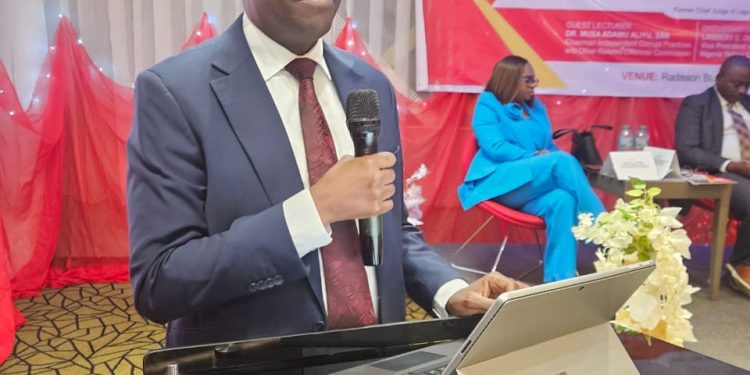By Nkechi Eze
The Chairman of the Independent Corrupt Practices and Other Related Offences Commission (ICPC), Dr. Musa Adamu Aliyu, SAN, has raised a stark warning that Africa risks losing its future to the deepening intersection of cybercrime, corruption, and illicit financial flows (IFFs), which siphon more than $80 billion from the continent every year. He delivered the caution in Lagos while presenting the keynote address at the Realnews 13th Anniversary Lecture Series in Ikeja.
In a statement signed by the Commission’s Spokesperson, J. Okor Odey, Dr. Aliyu said Africa’s developmental aspirations, including the African Union’s Agenda 2063, will remain elusive unless governments urgently strengthen cybersecurity systems, modernise regulatory frameworks, and block the loopholes that enable massive illicit outflows. Speaking on the theme “Cybersecurity, Illicit Financial Flows and Achieving Agenda 2063 in Africa,” he argued that the digital age has created new pathways for corruption and criminal innovation.
Illustrating the scale of the crisis, he disclosed that ICPC had, in one investigation, uncovered falsified expense claims by a multinational operating in Nigeria—funds he said were enough to fully rehabilitate at least 10 teaching hospitals. He described illicit financial flows not only as an economic threat but as a fundamental moral failure. “Every naira stolen is a classroom not built, a road abandoned, a hospital unequipped, and a generation short-changed,” he lamented.
Dr. Aliyu identified cyber-enabled crimes such as business email compromise, ransomware, mobile money fraud, and crypto-laundering as major drivers of illicit financial flows. He outlined various steps ICPC has taken to combat the threats, including establishing a Cybercrime and Digital Forensics Unit, enhancing blockchain tracing capabilities, strengthening collaboration with the NFIU and financial institutions, and expanding partnerships with global anti-corruption bodies. However, he admitted that criminal networks “remain faster, richer, and more technologically agile than government agencies,” largely because of limited resources, weak coordination, and jurisdictional complexities.
The Publisher of Realnews, Maureen Chigbo, said the annual lecture was created to advance policy reform by drawing national attention to illicit financial flows, which she described as one of Nigeria’s greatest obstacles to development. She urged journalists to deepen investigative reporting to expose hidden financial crimes.
The lecture was chaired by Honourable Justice Ayotunde Phillips, former Chief Judge of Lagos State and former Chairman of the Lagos Independent Electoral Commission (LASIEC). A panel of experts further dissected the challenges, stressing the urgent need for regulatory upgrades, stronger cross-sector cybersecurity collaboration, and enhanced digital governance.
Lasbery Oludimu, Vice President, Global Operations/Managing Director (Nigeria) at Yellow Card Financial Inc., emphasised that Nigeria must modernise its regulatory systems to keep pace with rapid technological changes. Dr. Favour Femi-Oyewole, Group Chief Information Security Officer at Access Bank, noted that no single institution can address evolving cyberthreats alone. Abdulrahman Mustapha, Chief Operating Officer, Intelligence & Security Services Support Sector at the NFIU, stressed the need for tighter regulation, improved protection of national databases, and digital governance that delivers measurable public value.
During the interactive session, participants called for stronger laws, broader public awareness, and more practical policy measures from both government and the private sector. Dr. Aliyu urged African governments to treat cybersecurity as a central development priority and adopt a six-pillar strategy built on stronger laws, institutional capacity, secure digital infrastructure, global cooperation, financial transparency, and active citizen engagement. He cautioned that “the Africa we want is within reach but only if we secure our digital space,” warning that Agenda 2063 will remain unattainable if cyber-enabled corruption persists.
















